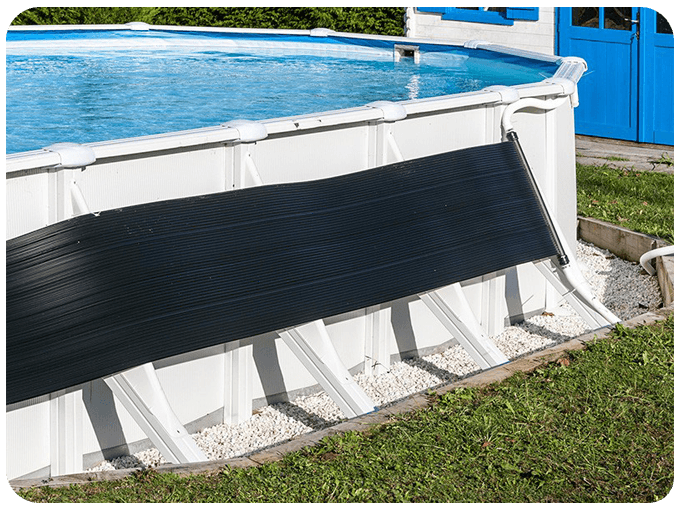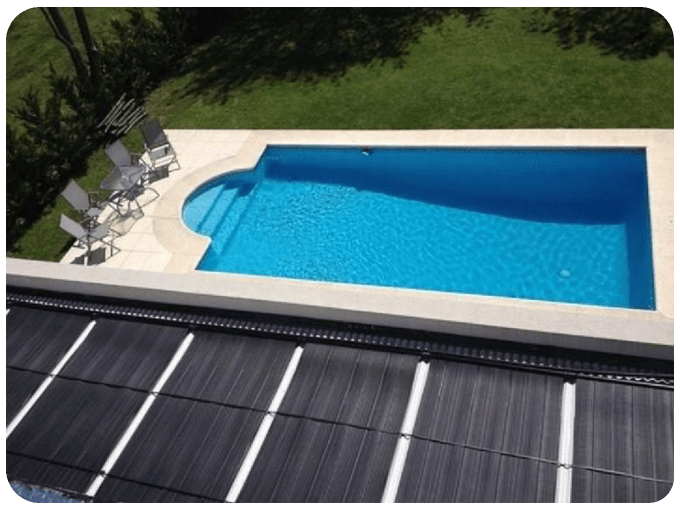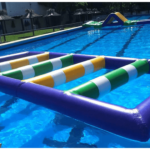Información actualizada April 25, 2024
Solar pool heaters for fiberglass pools have revolutionized the way we enjoy water in our recreational spaces. From their sustainable operation to economic efficiency, these devices offer an innovative and environmentally friendly solution to maintaining a pleasant temperature in your pool. Discover how you can make the most of this technology and transform your aquatic experience.
Table of Contents
What Are Solar Pool Heaters?
Solar pool heaters are devices that harness the sun’s energy to raise the water temperature in pools. This technology has gained popularity due to its sustainable and eco-friendly approach.
Importance of Water Temperature in Fiberglass Pools
In fiberglass pools, maintaining an appropriate water temperature is essential to ensure swimmers’ comfort and extend the pool’s usability season.
Advantages of Using Solar Pool Heaters for Fiberglass Pools
Sustainability and Environmental Friendliness
Solar heaters operate without consuming non-renewable resources, reducing carbon footprint, and promoting a more sustainable lifestyle. Discover how you can contribute to the environment while enjoying your pool.
Long-term Economic Savings
Although the initial investment may be higher, using solar pool heaters translates into significant savings over time. We’ll analyze how these devices can alleviate the economic burden associated with pool heating.
How Solar Pool Heaters Work
Principle of Solar Energy Collection
Solar pool heaters use photovoltaic panels to capture solar energy and transfer it to the pool water. We’ll explore this process and how it integrates with fiberglass pool structures.
Integration with Pool Water Circulation Systems
The effectiveness of solar pool heaters depends on their integration with pool water circulation systems. Discover how to optimize this connection for the best results.
Selection and Installation of Solar Pool Heaters
Choosing the Right Size Solar Heater for Your Fiberglass Pool is crucial to ensure optimal efficiency and satisfactory performance. Here are some tips for selecting the right size and a step-by-step installation process:
Tips for Choosing the Solar Heater Size:
- Calculate Your Pool’s Volume: Determine the total water volume in your pool by multiplying its length, width, and average depth.
- Consider Location and Climate: Take into account the amount of sunlight your area receives throughout the year and the predominant climate. If you live in an area with cold winters, you may need a larger heater to compensate.
- Evaluate Heater Efficiency: Review the specifications of the solar heater you are considering. Look for the heat transfer rate and hourly heating capacity. Make sure these figures are suitable for your pool’s volume.
- Consult a Professional: If you’re unsure about the right size, consider speaking with a solar heating system professional. They can make accurate calculations and recommendations based on your specific needs.
Step-by-step Installation Process:
- Select the Right Location: Choose an area exposed to sunlight for most of the day and as close as possible to the pool to minimize heat loss in the piping system.
- Install Solar Panels: Mount the solar panels on the roof or an elevated structure, ensuring they face south (in the northern hemisphere) or north (in the southern hemisphere) to capture maximum sunlight.
- Connect Solar Panels to the Pool’s Pipe System: Connect the solar panels to the pool’s pipe system using appropriate pipes and control valves to regulate water flow.
- Install the Controller and Pump: Install the solar heater controller in a protected area and connect the circulation pump to ensure a constant water flow through the solar panels.
- Test the System: Fill the pool with water and turn on the system. Ensure all connections are properly sealed and there are no leaks. Monitor water temperature and adjust the controller settings as needed.
- Regular Maintenance: Perform regular maintenance on the system, including cleaning the solar panels to remove any dirt or debris that may affect efficiency.
By following these tips and the step-by-step installation process, you’ll be able to choose the right size solar heater for your fiberglass pool and enjoy comfortable temperatures in your pool for longer. Always follow specific instructions provided by the solar heater manufacturer you choose.

Maintenance and Care of Solar Pool Heaters
Tips for Efficient Operation:
- Regular Cleaning:
- Perform periodic cleanings of the solar panels to remove dust, leaves, or other debris. Clean panels will more efficiently capture solar energy.
- Visual Inspection:
- Conduct regular visual inspections for potential damage or signs of wear. Ensure there are no cracks, breaks, or loose connections in the components.
- Solar Alignment:
- Check the alignment of the solar panels to ensure they are correctly oriented toward the sun. Adjust their position according to the season to maximize solar energy capture.
- Water Levels:
- Maintain proper pool water levels. Low water levels can affect solar heater efficiency as water won’t circulate optimally through the panels.
- Filtration System:
- Ensure the pool’s filtration system is in good condition. Clean, filtered water facilitates efficient solar heater operation.
- Proper Programming:
- If your system has programmable controls, adjust the programming according to the season and pool usage frequency. It’s not necessary to maintain a constant temperature throughout the year.
- Freezing Protection:
- In cold climates, install freeze protection systems to prevent damage to solar panels. Draining water from collectors in winter can be a preventive measure.
Common Troubleshooting:
- Low Performance:
- If you notice a decrease in performance, check for obstructions on the solar panels. Regular cleaning and maintenance often resolve this issue.
- Water Leaks:
- Leaks can occur due to worn connections or panel damage. Visually inspect for moisture signs and repair any leaks promptly.
- Circulation Issues:
- Ensure the pool pump and circulation system are functioning correctly. Lack of circulation can affect heat transfer through solar panels.
- Electrical Problems:
- If there are electrical issues, check connections and ensure no loose or damaged wires. If problems persist, consult an electrical professional.
- Condensation on Panels:
- Condensation can occur on cold days. This is usually not a problem, but if persistent, ensure panels are well sealed and consider installing a ventilation system.
- Animal Damage:
- Inspect panels for possible animal damage. Small rodents or birds may create nests on solar panels, affecting their performance.
Comparison with Other Pool Heating Methods
Solar Pool Heaters vs. Electric Heaters
We compare solar pool heaters with electric heaters, highlighting key differences in terms of costs, efficiency, and sustainability. Discover why solar heaters are a superior choice for fiberglass pools.
-
Solar Pool Heaters:
- Renewable Energy Source:
- Solar heaters harness the sun’s energy, a renewable and sustainable energy source. This reduces reliance on fossil fuels and promotes eco-efficiency.
- Low Operating Costs:
- Although the initial investment may be higher, operating costs are low as they don’t require additional electricity once installed. Solar energy is free and abundant.
- Low Environmental Impact:
- Using solar energy reduces carbon emissions and minimizes environmental impact. It contributes to sustainability and aligns with eco-friendly practices.
- Long Lifespan:
- Solar panels typically have a long lifespan with proper maintenance. This means a long-term investment that can yield significant savings.
-
Electric Heaters:
- Easy Installation:
- Electric heaters are usually easy to install and don’t require complex infrastructure. They’re a convenient choice for smaller pools or temporary installations.
- Precise Temperature Control:
- Electric heaters allow precise water temperature control. This can be beneficial for maintaining a consistent temperature according to user preferences.
- Quick Heating:
- Electric heaters can quickly heat water, providing immediate results. This can be useful in situations where instant warmth is needed.
- Lower Initial Investment:
- Generally, electric heaters have a lower initial investment compared to solar systems. This can be appealing for those with tighter budgets.
Benefits Compared to Traditional Heating Systems
We analyze how solar pool heaters outperform traditional heating methods, providing additional benefits and a more enjoyable experience for users.
- Energy Efficiency:
- Solar pool heaters are more energy-efficient as they utilize a free and abundant energy source. They reduce dependence on non-renewable fuels.
- Environmental Sustainability:
- Using solar energy reduces carbon footprint and contributes to sustainable practices. Solar systems are environmentally friendly compared to traditional methods that can generate polluting emissions.
- Lower Long-term Costs:
- Despite a higher initial investment, solar pool heaters tend to generate lower operating costs over time. Solar energy is free, resulting in significant savings.
- Energy Independence:
- Solar pool heaters provide greater energy independence by utilizing a local and renewable energy source. This can be beneficial in regions where electrical infrastructure is less reliable.

Success Stories and User Testimonials
Real experiences with solar pool heaters in fiberglass pools
Learn about real people’s experiences who have implemented solar pool heaters in their fiberglass pools. Their testimonials highlight the benefits and satisfaction they have experienced.
Positive Impact on User Experience
Discover how using solar pool heaters has improved overall user experience, providing not only ideal temperatures but also an eco-friendly approach.
Current Trends in Solar Pool Heater Use
Increasing demand and popularity
The demand for solar pool heaters for fiberglass pools is growing. We’ll explore the reasons behind this increasing popularity and how this trend is transforming the industry.
Technological Innovations in the Sector
The latest technological innovations in solar pool heaters are taking this technology to new levels. Discover the latest trends and how these innovations enhance device efficiency and functionality.
Environmental and Energy Considerations
Reducing carbon footprint
Solar pool heaters are a key option for those looking to reduce their carbon footprint. We’ll explore how using this technology contributes to environmental sustainability and the fight against climate change.
Contribution to Sustainable Energy
In addition to reducing carbon footprint, solar pool heaters contribute to sustainable energy generation. Discover how this aspect positively impacts the environment and the community at large.
Tips to Maximize Solar Pool Heater Efficiency
Use in Specific Seasons
Optimize your solar heater’s performance by adjusting its use according to the season. Learn how to make the most of available solar energy during different times of the year.
Combination with Thermal Covers
Combining solar pool heaters with thermal covers enhances system efficiency. Discover how these two technologies work together to deliver exceptional results.
Frequently Asked Questions about Solar Pool Heaters for Fiberglass Pools
Are solar pool heaters efficient in cloudy climates?
Yes, solar pool heaters can be efficient in cloudy climates, although their performance may be affected compared to sunny days. While solar panels are most effective when receiving direct sunlight, they can still generate heat under cloudy conditions. Solar pool heaters use diffuse solar radiation, which is sunlight dispersed through clouds, to heat pool water. However, it’s important to note that efficiency may decrease during completely cloudy days or in areas with persistently low sunlight. Geographic location and local climate conditions also influence solar heater effectiveness in cloudy climates.
How long does it take to install a solar pool heater?
The duration of solar pool heater installation for fiberglass pools varies depending on factors such as system size, location, and installer experience. This process typically takes between one to three days and involves site assessment and preparation, mounting solar panels in the appropriate location, making connections and configurations, conducting testing and adjustments, and providing owner training. Specialized professional intervention is crucial to ensure optimal operation and avoid potential issues in the future. Specific duration will depend on project complexity and site conditions.
Conclusion
Solar pool heaters for fiberglass pools offer an innovative and sustainable solution to maintain a pleasant temperature in your aquatic space. From environmental respect to economic savings, these devices significantly enhance the user experience.


